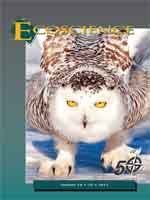It is increasingly recognized that ecosystems are not closed systems and that exchanges of resources across ecosystem boundaries can have repercussions on food webs, especially in low productivity systems such as the terrestrial Arctic. However, because these exchanges can take multiple forms, assessing their significance in the functioning of the tundra food web is difficult. In this paper, we first review some important concepts related to resource exchanges between ecosystems and examine their relevance to the study of trophic interactions in the arctic tundra. An analysis of the Bylot Island food web in the Canadian Arctic using a mass-balance trophic model suggests that predators are the dominant force controlling this food web. However, an important feature of this ecosystem is that several top predators benefit from allochthonous inputs, either through the presence of migratory birds during the summer or the use of the marine environment as a foraging ground in winter. We also show that migratory birds may act as autochthonous resource exporters for lower trophic levels, for instance by removing nitrogen from the nutrient pool when young produced locally migrate south and die away from the system. Although these resource exchanges may be a general feature of several arctic terrestrial ecosystems, their importance in the functioning of the tundra food web remains to be determined. Through long-term monitoring, we found that primary production in wetlands of Bylot Island increased by 85% over a 20-y period, likely a consequence of the warming trend observed in the area. However, we have not detected any changes at higher trophic levels, which is consistent with a top-down control of this food web. Given the importance of resource exchanges between ecosystems in the dynamics of the tundra food web, a full investigation of the effects of climate change will require a broader cross-ecosystem perspective.
How to translate text using browser tools
1 September 2011
The Tundra Food Web of Bylot Island in a Changing Climate and the Role of Exchanges between Ecosystems
Gilles Gauthier,
Dominique Berteaux,
Joël Bêty,
Arnaud Tarroux,
Jean-François Therrien,
Laura McKinnon,
Pierre Legagneux,
Marie-Christine Cadieux
ACCESS THE FULL ARTICLE

Ecoscience
Vol. 18 • No. 3
September 2011
Vol. 18 • No. 3
September 2011
allochthonous input
arctic predator
changement climatique
climate change
cross-ecosystem resource exchange
échange entre écosystèmes
interaction trophique




